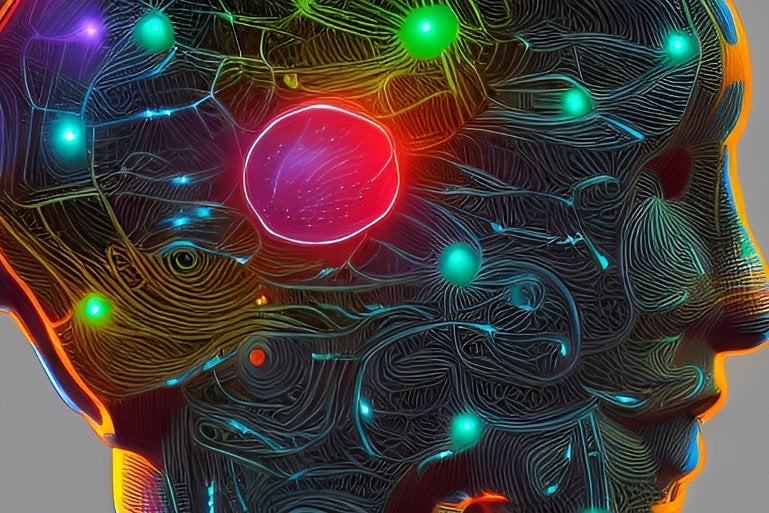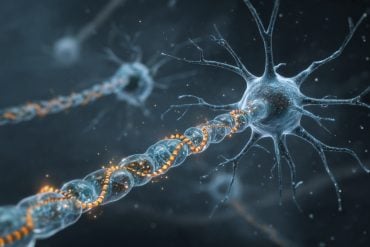Summary: COVID-19 infection activates the same inflammatory response in the brain as Parkinson’s disease, a new study reports.
Source: University of Queensland
Research led by The University of Queensland has found COVID-19 activates the same inflammatory response in the brain as Parkinson’s disease.
The discovery identified a potential future risk for neurodegenerative conditions in people who’ve had COVID-19, but also a possible treatment.
The UQ team was led by Professor Trent Woodruff and Dr. Eduardo Albornoz Balmaceda from UQ’s School of Biomedical Sciences, and virologists from the School of Chemistry and Molecular Biosciences.
“We studied the effect of the virus on the brain’s immune cells, ‘microglia’ which are the key cells involved in the progression of brain diseases like Parkinson’s and Alzheimer’s,” Professor Woodruff said.
“Our team grew human microglia in the laboratory and infected the cells with SARS-CoV-2, the virus that causes COVID-19.
“We found the cells effectively became ‘angry,’ activating the same pathway that Parkinson’s and Alzheimer’s proteins can activate in disease, the inflammasomes.”
Dr. Albornoz Balmaceda said triggering the inflammasome pathway sparked a “fire” in the brain, which begins a chronic and sustained process of killing off neurons.
“It’s kind of a silent killer, because you don’t see any outward symptoms for many years,” Dr. Albornoz Balmaceda said.
“It may explain why some people who’ve had COVID-19 are more vulnerable to developing neurological symptoms similar to Parkinson’s disease.”
The researchers found the spike protein of the virus was enough to start the process and was further exacerbated when there were already proteins in the brain linked to Parkinson’s.
“So if someone is already pre-disposed to Parkinson’s, having COVID-19 could be like pouring more fuel on that ‘fire’ in the brain,” Professor Woodruff said.
“The same would apply for a predisposition for Alzheimer’s and other dementias that have been linked to inflammasomes.”

But the study also found a potential treatment.
The researchers administered a class of UQ-developed inhibitory drugs which are currently in clinical trials with Parkinson’s patients.
“We found it successfully blocked the inflammatory pathway activated by COVID-19, essentially putting out the fire,” Dr. Albornoz Balmaceda said.
“The drug reduced inflammation in both COVID-19-infected mice and the microglia cells from humans, suggesting a possible treatment approach to prevent neurodegeneration in the future.”
Professor Woodruff said while the similarity between how COVID-19 and dementia diseases affect the brain was concerning, it also meant a possible treatment was already in existence.
“Further research is needed, but this is potentially a new approach to treating a virus that could otherwise have untold long-term health ramifications.”
The research was co-led by Dr. Alberto Amarilla Ortiz and Associate Professor Daniel Watterson and involved 33 co-authors across UQ and internationally.
About this COVID-19 and neuroinflammation research news
Author: Press Office
Source: University of Queensland
Contact: Press Office – University of Queensland
Image: The image is in the public domain
Original Research: Open access.
“SARS-CoV-2 drives NLRP3 inflammasome activation in human microglia through spike protein” by Eduardo A. Albornoz et al. Molecular Psychiatry
Abstract
SARS-CoV-2 drives NLRP3 inflammasome activation in human microglia through spike protein
Coronavirus disease-2019 (COVID-19) is primarily a respiratory disease, however, an increasing number of reports indicate that SARS-CoV-2 infection can also cause severe neurological manifestations, including precipitating cases of probable Parkinson’s disease.
As microglial NLRP3 inflammasome activation is a major driver of neurodegeneration, here we interrogated whether SARS-CoV-2 can promote microglial NLRP3 inflammasome activation.
Using SARS-CoV-2 infection of transgenic mice expressing human angiotensin-converting enzyme 2 (hACE2) as a COVID-19 pre-clinical model, we established the presence of virus in the brain together with microglial activation and NLRP3 inflammasome upregulation in comparison to uninfected mice.
Next, utilising a model of human monocyte-derived microglia, we identified that SARS-CoV-2 isolates can bind and enter human microglia in the absence of viral replication.
This interaction of virus and microglia directly induced robust inflammasome activation, even in the absence of another priming signal. Mechanistically, we demonstrated that purified SARS-CoV-2 spike glycoprotein activated the NLRP3 inflammasome in LPS-primed microglia, in a ACE2-dependent manner.
Spike protein also could prime the inflammasome in microglia through NF-κB signalling, allowing for activation through either ATP, nigericin or α-synuclein. Notably, SARS-CoV-2 and spike protein-mediated microglial inflammasome activation was significantly enhanced in the presence of α-synuclein fibrils and was entirely ablated by NLRP3-inhibition.
Finally, we demonstrate SARS-CoV-2 infected hACE2 mice treated orally post-infection with the NLRP3 inhibitory drug MCC950, have significantly reduced microglial inflammasome activation, and increased survival in comparison with untreated SARS-CoV-2 infected mice.
These results support a possible mechanism of microglial innate immune activation by SARS-CoV-2, which could explain the increased vulnerability to developing neurological symptoms akin to Parkinson’s disease in COVID-19 infected individuals, and a potential therapeutic avenue for intervention.






